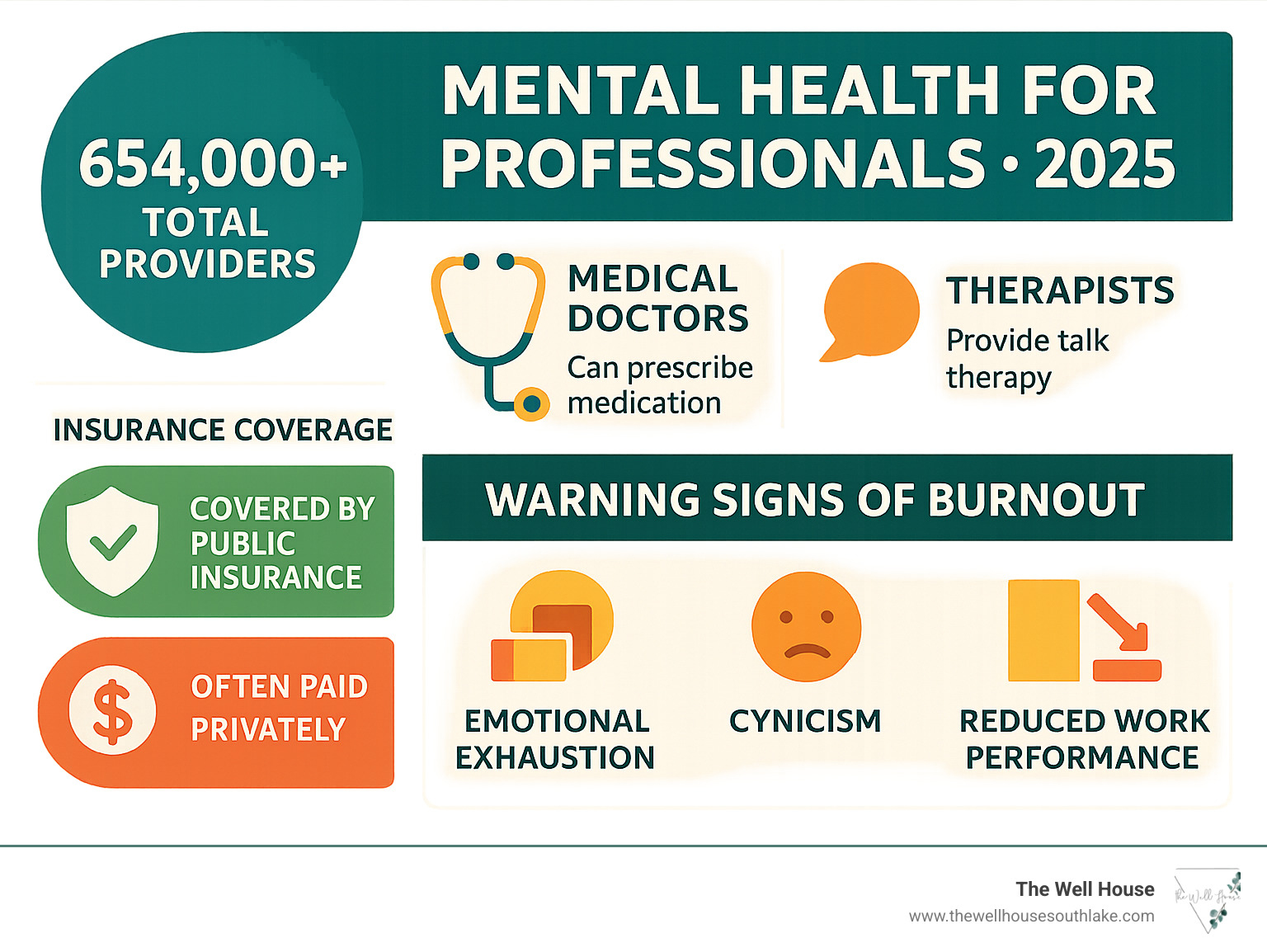Navigating the Professional Landscape to Find Your Ideal Therapist
Why Mental Health Matters More Than Ever for Working Professionals
Mental health for professionals has become a critical concern in today’s high-pressure work environment. Here’s a brief overview:
Key Types of Mental Health Professionals:
- Medical Doctors (Psychiatrists, Family Doctors) – Can prescribe medication.
- Therapists & Counselors (Psychologists, Psychotherapists) – Provide talk therapy, often paid privately or through insurance.
- Specialized Support (Occupational Therapists, Peer Specialists) – Address specific workplace challenges.
When to Seek Help:
- Persistent stress affecting work performance
- Burnout symptoms like exhaustion or cynicism
- Anxiety, depression, or sleep problems
- Difficulty managing work-life balance
How to Find Support:
- Start with your family doctor for referrals
- Check insurance coverage and directories
- Consider Employee Assistance Programs (EAPs)
- Look for providers specializing in professional burnout
The statistics are striking. Nearly half of all adults will experience a mental illness during their lifetime. For professionals juggling demanding careers, family responsibilities, and personal expectations, this reality hits even closer to home.
The good news? There are hundreds of thousands of mental health professionals ready to help. The challenge is knowing where to start and finding the right fit for your unique situation.
I’m Jennifer Kruse, a Licensed Professional Counselor Supervisor who specializes in supporting professionals through burnout, compassion fatigue, and the unique mental health challenges that come with demanding careers. My holistic approach to mental health for professionals helps busy individuals refind balance and authentic expression while managing their professional responsibilities.

Mental health for professionals terms made easy:
- emotional intelligence counseling
- career counseling for millennials
- counseling for graduate students
Recognizing the Signs: When Professional Stress Becomes a Mental Health Concern
For working professionals, stress can feel like a constant companion. But there’s a major difference between everyday stress and mental health for professionals concerns that require serious attention.

Every profession has occupational hazards. Healthcare workers and first responders often face compassion fatigue—exhaustion from caring for others in distress. They might also experience moral injury, which occurs when forced to act against their values due to workplace constraints. However, the relentless pace of modern work can wear down anyone.
What’s the difference between stress and burnout? Stress is being over-engaged and hyperactive. Burnout is complete emotional, physical, and mental exhaustion from prolonged stress. You’re not just running on fumes; you’re completely empty.
If you’re wondering where you stand, the ProQOL measure can help assess your professional quality of life. And if you’re feeling overwhelmed, our guide on What to Do When You’re Feeling Overwhelmed offers practical strategies.
Signs and Symptoms of Burnout and Mental Distress
Your body and mind send warning signals; the trick is to listen. Mental health for professionals concerns often start small but can snowball if ignored.
- Emotional exhaustion is a key red flag. You feel drained, and what used to energize you now feels impossible.
- Cynicism or detachment may follow. You develop a negative, distant attitude toward your work, colleagues, or clients.
- Reduced professional efficacy attacks your sense of purpose. You feel ineffective, no matter how hard you try.
Physical warning signs include irritability, sleep disturbances, unexplained headaches and stomach issues, or getting sick more often. Other signs are losing pleasure in work, difficulty focusing, increased isolation, and persistent thoughts about work after hours. These symptoms often develop gradually, making them easy to dismiss as “just part of the job.” Recognizing them early is crucial. Our resources on Stress Management Young Adults offer strategies that work for professionals of all ages.
The Potential Consequences of Ignoring Occupational Stress
Ignoring occupational stress is like ignoring a crack in a foundation—eventually, the structure can fail.
Damage to yourself can be devastating. Chronic stress can lead to depression, anxiety, or substance abuse. Your relationships may suffer as you become more irritable and withdrawn, and physical health problems can develop.
Damage to clients is equally serious, especially in caring roles. When you’re running on empty, you might make errors, violate boundaries, or provide subpar care, eroding client trust.
Damage to the profession extends beyond individual cases. High attrition rates, lawsuits, and negative publicity harm the credibility of entire fields. As highlighted by resources for frontline professionals, caring for others requires caring for yourself first.
Addressing mental health for professionals isn’t just about personal well-being—it’s about maintaining professional integrity. Taking care of yourself isn’t selfish; it’s essential.
Who Can Help? Understanding the Different Types of Mental Health Professionals
When you realize you need support for your mental health for professionals, the next question is often: “Who do I talk to?” The landscape of mental health professionals can seem complex, but understanding the roles can help you steer your journey with confidence.
It’s reassuring to know a strong network of support is available. The U.S. has a vast number of mental health professionals ready to help. Each type offers different kinds of support, and finding the right match is key.
The main distinction is between medical doctors who can prescribe medication and therapists or counselors who focus on talk therapy. One focuses on the biological aspects of mental health, while the other addresses the psychological and emotional sides. Training and licensing requirements vary, which affects the services they can offer.
Medical Doctors: Psychiatrists and Family Doctors
For medication management related to mental health for professionals, medical doctors are your go-to providers.
Psychiatrists are medical doctors who specialize in mental health. They are trained to diagnose and treat mental illness from a biological perspective, considering brain chemistry, genetics, and medical conditions. Their primary role is often prescribing and managing medications, especially for complex conditions. In the U.S., care from psychiatrists is often covered by health insurance, though coverage details vary.
Your family doctor is an excellent starting point. They know your medical history and can provide initial support, prescribe basic medications, and offer referrals to specialists.
Therapists and Counselors: Experts in Talk Therapy
Therapists and counselors are experts in talk therapy, helping you explore thoughts, feelings, and behaviors to create lasting change.
Psychologists hold doctoral degrees (Ph.D. or Psy.D.) and are trained to use psychological tests for assessment and diagnosis. They provide various forms of psychotherapy, such as cognitive-behavioral therapy (CBT). You can learn more about their role from the American Psychological Association.
Psychotherapists and Clinical Counselors are broad terms for professionals who provide talk therapy to help with emotional problems and mental health conditions. They often focus on practical coping strategies. It’s always wise to check their credentials and training, as regulations can vary by state.
Social Workers with mental health training provide therapy while also considering your broader life circumstances, like community resources and social support systems. They are skilled at connecting you with practical support. The National Association of Social Workers outlines their ethical standards and role.
Here’s a quick comparison:
| Professional | Services Offered | Education | Can Prescribe Medication? |
|---|---|---|---|
| Psychiatrist | Diagnosis, medication management, some therapy | Medical Doctor (MD/DO) | Yes |
| Psychologist | Assessment, diagnosis, psychotherapy (talk therapy) | Doctoral degree (Ph.D./Psy.D.) | No (with rare exceptions) |
| Psychotherapist | Primarily talk therapy | Varies (Master’s or higher) | No |
Other Specialized and Support Roles
Several other specialists can play a role in supporting your mental health for professionals.
Occupational Therapists help people overcome barriers to everyday activities, including work tasks and routines. The American Occupational Therapy Association provides more information on their scope of practice.
Psychiatric Nurses have advanced nursing degrees in mental health. In some states, they can prescribe medication, making them a key part of the care team.
Peer Specialists are individuals with lived experience of mental health challenges who use that experience to support others. The National Alliance on Mental Illness (NAMI) highlights the value of peer support.
Career Counselors help with career transitions and work-life balance, which directly impacts mental health. Our guide on Career Counseling for Millennials offers relevant insights for professionals at any career stage.
A Practical Guide to Finding the Right Provider
Finding the right mental health professional can feel daunting, but a step-by-step approach can help you find someone who understands the pressures you face.

Many people start by talking to their family doctor for trusted referrals. Understanding your insurance coverage is also crucial, as it often determines which providers are financially accessible. Telehealth has made mental health for professionals more accessible than ever, allowing you to connect with therapists from your office or home. At The Well House, we offer online counseling and therapy options designed for busy schedules.
Once you have a few potential providers, asking thoughtful questions during initial consultations helps you find the right match.
How to Start Your Search for Mental Health Support
Here’s how to begin building your support team:
- Your primary care provider is an excellent first stop for assessing your needs and getting trusted referrals.
- Insurance directories on your provider’s website can help you find covered professionals by location and specialty.
- Professional association websites maintain directories of licensed professionals with details on their specializations.
- Employee Assistance Programs (EAPs) are confidential, employer-sponsored programs that often provide initial counseling sessions and referrals at no cost.
- Trusted recommendations from colleagues or friends can also be invaluable.
The Mayo Clinic’s guide to finding a mental health professional offers more tips for navigating these resources.
What to Look for in a Mental Health Provider
Finding the right provider is about both credentials and connection.
- Credentials and licensing are non-negotiable. Verify that the provider is licensed to practice in your state.
- Specializations make a huge difference. If you’re dealing with burnout, look for a provider who specializes in occupational stress. For trauma, consider approaches like EMDR Therapy in Southlake, TX – Complete Guide.
- Treatment approaches vary widely (e.g., CBT, mindfulness, trauma-focused). Find an approach that feels right for you.
- Cultural competence includes understanding your professional culture, whether you’re in healthcare, law, or tech.
- Personal connection is key. During consultations, ask yourself: Do I feel heard and understood? Trust your instincts.
Resources for Specific Mental Health Conditions
Sometimes mental health for professionals requires targeted support for common conditions.
Anxiety often manifests as constant worry about deadlines or performance. Our guide on Strategies to Calm Down With Anxiety offers practical techniques. For ongoing support, organizations like the Anxiety & Depression Association of America (ADAA) provide specialized services.
Depression can be challenging as it affects motivation, concentration, and energy. The ADAA also offers depression-specific resources and support.
PTSD is more common among professionals than many realize, especially in high-stress fields. The National Center for PTSD provides excellent information on symptoms and treatments. Therapies like EMDR, which we specialize in, have shown great success in helping professionals heal from trauma.
Seeking help is a sign of wisdom. The sooner you address these challenges, the sooner you can get back to thriving.
Building Your Support System: Strategies for Well-Being
Even the strongest professionals need a robust support system to maintain mental well-being. This includes self-care practices, a healthy workplace culture, and the support of loved ones.

Think of your support system as a three-legged stool: personal self-care, workplace support, and family and friends. When all three are strong, you have the stability to weather professional storms. Prioritizing mental health for professionals isn’t a luxury—it’s essential. The American Psychological Association offers self-care resources for psychologists that apply to anyone in a demanding field, reminding us that taking care of ourselves is necessary for doing our best work.
Effective Self-Care Strategies for Demanding Professions
Real self-care for busy professionals is practical and sustainable.
- Mindfulness and meditation can be as simple as taking three deep breaths between meetings. We often integrate EMDR and Mindfulness to help create that essential mental pause.
- Setting boundaries is crucial. This means saying “no” to extra projects, turning off work emails after hours, and protecting your time off.
- Physical activity doesn’t require a gym. A brisk walk at lunch or taking the stairs can release tension and boost your mood.
- Hobbies and leisure remind you that you’re more than your job. These activities give your professional brain a much-needed break.
- Prioritizing sleep is non-negotiable. Create a consistent bedtime routine and protect it like an important meeting.
How Employers and Colleagues Can Foster a Healthy Workplace
Organizations play a huge role in supporting mental health for professionals.
- Creating a culture of openness starts with leadership. When leaders talk honestly about mental health, it gives everyone permission to be human.
- Providing mental health resources like EAPs and ensuring they are accessible and promoted is key.
- Flexible work arrangements, when possible, help professionals manage personal and professional demands.
- Manager training equips supervisors to recognize when team members are struggling and respond supportively.
- Peer support programs connect colleagues who understand each other’s challenges. The Essential Network for Health Professionals is a great example of how powerful this can be.
How Family and Friends Can Offer Support
The people closest to us often want to help but aren’t sure how. Here are a few ways they can provide meaningful support.
- Listening without judgment is a powerful gift. Sometimes, we just need someone to listen and validate our feelings.
- Encouraging professional help should be framed as an act of strength. You might say, “I care about you. Have you thought about talking to someone?”
- Offering practical support, like helping with chores or meals, can relieve everyday pressures.
- Educating themselves on what their loved one is experiencing helps them provide better support. Resources from organizations like NAMI for family members offer excellent information.
Building a strong support system takes time. Every step toward better mental health for professionals matters.
Frequently Asked Questions about Mental Health for Professionals
When you’re considering reaching out for mental health for professionals support, it’s natural to have questions. Here are some of the most common concerns.
Which mental health professional can prescribe medication?
Only medical doctors can prescribe medication for mental health conditions. This includes psychiatrists (who specialize in mental health) and your family doctor or general practitioner.
In some states, psychiatric nurse practitioners may also have the authority to prescribe medication. Psychologists, psychotherapists, and counselors are highly skilled in talk therapy but cannot prescribe medication. They can, however, coordinate care with a medical doctor if medication seems appropriate.
Is mental health care covered by insurance?
In the U.S., coverage for mental health care varies widely. Services from medical doctors like psychiatrists are often covered by health insurance plans. For therapists and counselors, coverage depends on your specific insurance plan.
Many employer-sponsored plans offer benefits for a certain number of sessions with in-network providers. It’s always best to check your benefits package or contact your insurance company directly to understand what’s covered. Many people also pay for services out-of-pocket.
How can I find confidential support without my employer knowing?
Privacy is a major concern for professionals, but mental health services are confidential by law.
Private practice therapists are bound by strict confidentiality rules. Your employer will not know you are seeking therapy unless you choose to tell them. Your family doctor can also provide confidential referrals.
Many professionals choose to use their private insurance benefits or pay out-of-pocket to maintain this privacy. This gives you complete control over who knows about your care.
Telehealth services offer another discreet way to access care from any private location, which is especially helpful for busy professionals who value both privacy and convenience.
Conclusion
Your mental health is as important as your professional success—the two are deeply connected. This guide has explored how mental health for professionals is an ongoing investment in your well-being, both in and out of the office.
We’ve covered the warning signs of burnout, the different types of professionals who can help, and practical ways to find the right support. The variety of help available means there is someone who understands what you’re going through and has the right tools to help.
Taking the first step to seek help is a sign of strength. It shows you’re committed to being the best version of yourself, personally and professionally.
At The Well House, we understand the unique pressures of demanding careers. Our collaborative, holistic approach focuses on your whole self—mind, body, and spirit. We know that professional stress doesn’t just stay at work; it impacts your relationships and can leave you feeling depleted.
We work with you to create a support plan that fits your life. Whether you prefer in-person sessions in our Southlake office or need the flexibility of telehealth, we’re here to help you steer your challenges.
You don’t have to wait for a crisis to seek support. Investing in your mental health before it becomes a major issue is a wise and proactive choice.
When it gets real, get real help. If you’re ready to take that next step, we’d love to support you on this journey. Check out our comprehensive approach: When it gets real, get real help with counseling for young adults.
Your career is important, but you are more than your job title. You deserve to feel fulfilled, balanced, and genuinely well. That’s what true mental health for professionals looks like, and it’s within your reach.
Insurance & Payment Options at The Well House Southlake
At The Well House Southlake, we believe that quality mental health care should be both accessible and affordable. Whether you’re seeking therapy, couples counseling, or online sessions, our goal is to make it easy for you to access therapy that takes insurance and supports your unique needs.
We currently accept:
- Blue Cross Blue Shield (BCBS)
- Aetna
- United Health care (UHC)
- Self-Pay and Out-of-Network Options
If you’re exploring counseling that takes insurance or need help verifying your coverage, our team will guide you through each step — from confirming your benefits to booking your first session. We’re committed to making your experience simple and stress-free, so you can focus on what matters most: your well-being.












